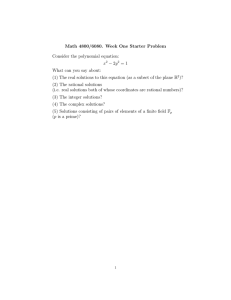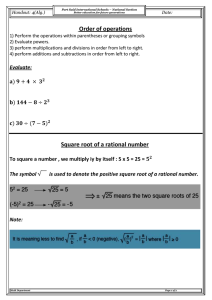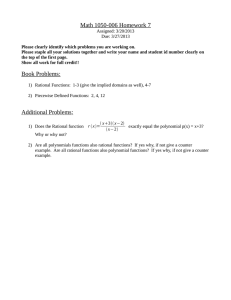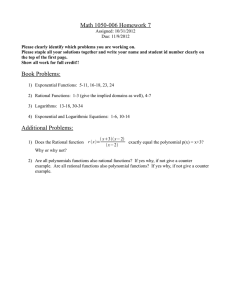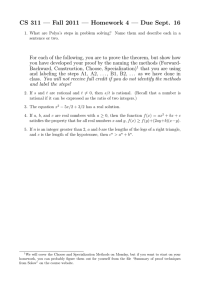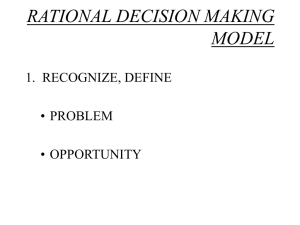Document 13578461
advertisement
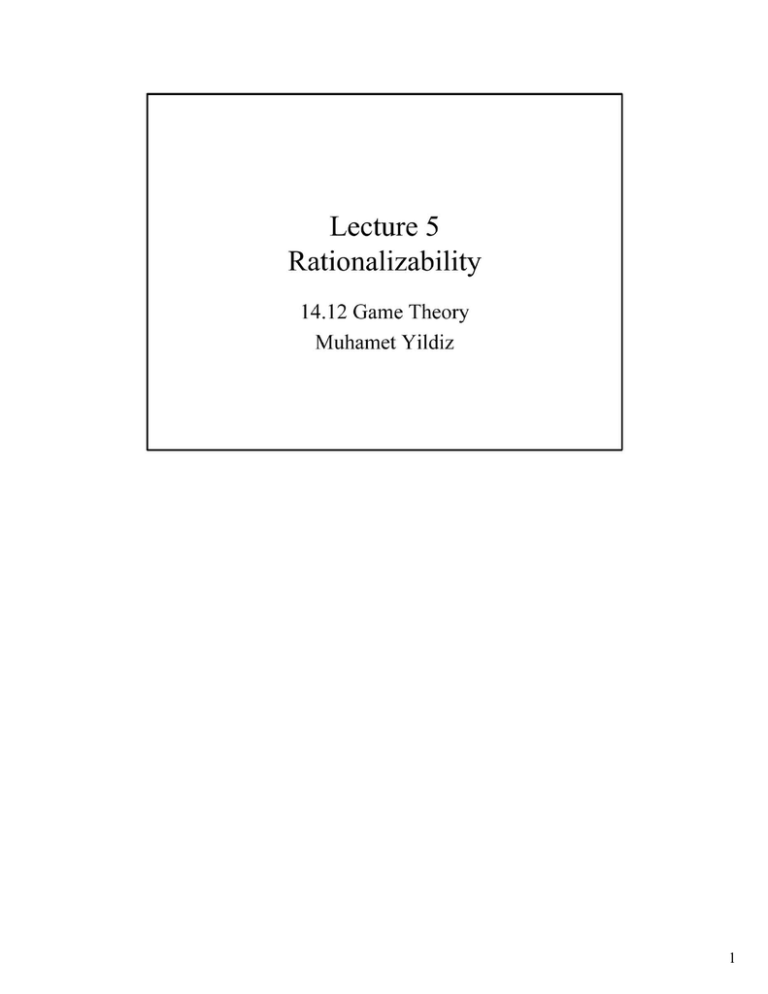
Lecture 5
Rationalizability
14.12 Game Theory
Muhamet Yildiz
1
vM = 0
V T = 2p-(I-p) = 3p-1
Recall: A Game
VB = -p+2 (I-p) = 2-3p
V
L
R
T
(2,0)
(-1,1)
M
(0,10) (0,0)
B
(-1,-6)
p
(2,0)
2
o ~----~--~~----
-I
L -______________~
o
I-p
p
1
2
Recap: Rationality & Dominance
• Belief: A probability distribution p_; on others' strategies;
• Mixed Strategy : A probability distribution (Ji on own strategies;
• Playing s;* is rational
~
s;* is a best response to a belief p_;: VS i
Ls_i Ui(S ;*,Lap-i(La
;::::
Ls_i Ui(S ;,Lap-i(Li)
• (Ji dominates s;'* ~ VS_ i
Lsi Ui (S;,La(Ji (Si) > Ui(S /* ,Li)
• Theorem: Playing s;* is rational
~
s;* is not dominated.
3
Assume
Player I is rational
L
R
T
(2,0)
(-1,1)
M
(0,10) (0,0)
B
(-1,-6)
(2,0)
Player 2 is rational
Player 2 is rational and
Knows that Player I is rational
Player I is rational,
knows that 2 is rational
knows that 2 knows that
I is rational
4
Assume
P I is rational
2
L
m
R
T
(3,0)
(1,1)
(0,3)
M
(1,0)
(0,10)
(1,0)
B
(0,3)
(1,1)
(3,0)
I
P2 is rational and
knows that PI is rational
P I is rational and
knows all these
5
Rationalizability
Eliminate all the strictly
dominated strategies.
Yes
y dominated strate
In the new game?
No
Rationalizable strategies
The play is rationalizable, provided that . ..
6
Important
• Eliminate only the strictly dominated
strategies
- Ignore weak dominance
• Make sure to eliminate the strategies
dominated by mixed strategies as well as
pure
7
Beauty Contest
• There are n students.
• Simultaneously, each student submits a
number Xi between 0 and 100.
• The payoff of student i is 100 - (Xi - 2i/3)2
where
n
8
Rationalizability in Beauty Contest
If Xi
Expected value of sum of Xj withJ:;ti, best strategy is
(2/3)X) (n-2 /3)
After Round 1:
=
0, 2 n -1 100]
[ 3 n-2/3
After Round 2:
0,(2 n-1 J2 100 ]
[ 3 n-2/3
After Round k:
0,(2 n-1 Jk 100 ]
[ 3 n -2/3
Rationalizability = {O}.
9
with m mischievous students
Payoff for mischievous: (Xi - 2x/3)2
Round 1: only 0 and 100 survive for-mischievous; same
as before for normal
Rounds 2 to k(m,n )-1: no elimination for mischievous;
same as before for normal
Round k(m,n): eliminate 0 for mischievous; same as
before for normal
Round k> k(m,n):
- Strategies for normal after round k
Lk = 2100m+(n-m-1)L k_1
3
n - 2/3
=
[Lk,Hkl
H _ 2100m+(n-m-1)Hk_l
k- 3
n-2/3
Ratinalizability = mischievous 100, norma1200m/(n+2m)
10
Matching pennies with perfect information
2
1
HH
TH
TT
Head (-1,1) -1 ,1)
(1, -1) (1,-1)
(1,-1) -1,1)
(1,-1) (-1,1)
Tail
Head
HT
Tai
2
2
head
(-1 ,1)
head
(1,-1 )
(1,-1)
tail
,
(-1,1)
11
A summary
• If players are rational and cautious, they play the
dominant-strategy equilibrium whenever it exists
- But, typically, it does not exist
• If rationality is common knowledge, a
rationalizable strategy is played
- Typically, there are too many rationalizable
strategies
• Nash Equilibrium: the players correctly guess
the other players' strategies (or conjectures).
12
MIT OpenCourseWare
http://ocw.mit.edu
14.12 Economic Applications of Game Theory
Fall 2012
For information about citing these materials or our Terms of Use, visit: http://ocw.mit.edu/terms.

